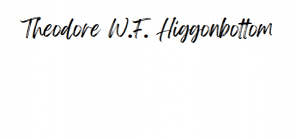How do Genealogists Verify Research Findings?
December 26, 2024
Dear Mr. Higgonbottom,
As a genealogist, how do you verify the accuracy of your research findings?
Dear Curious Researcher,
As you guessed, part of a genealogist’s job is to verify information through a systematic process that combines critical evaluation, primary sources, and a clear understanding of historical context. Here are the key methods I find particularly useful to ensure accuracy:
1. Consult Primary Sources
Primary sources are firsthand records created at the time of an event. Examples include:
- Birth, marriage, and death certificates
- Census records
- Wills and probate documents
- Land deeds and tax records
- Church baptismal and burial registers
These sources are considered the most reliable because they were typically recorded by someone directly involved or present at the event.
2. Evaluate Secondary Sources
Secondary sources are, as the name applies, sources that come from secondary knowledge of an event. This includes things like family histories or genealogies compiled by others. Although secondary sources can be reliable, genealogists treat these sources with caution and check them against primary sources to confirm their accuracy.
3. Cross-Reference Multiple Sources
The best way to ensure that information is accurate and complete is to cross-reference it with multiple sources. To do this, genealogists look for consistent information across several documents.
If there are discrepancies within the documents, genealogists weigh the reliability of each source (e.g., official records vs. personal recollections) to determine which is most dependable.
4. Use Original Documents
Whenever possible, genealogists access original records rather than transcriptions or summaries. This is because human error is a real issue and transcription mistakes can occur. Accessing original records ensures that nothing has been lost in translation.
5. Apply the Genealogical Proof Standard (GPS)
When conducting research, professional genealogists follow the Genealogical Proof Standard (GPS), which requires:
- A reasonably exhaustive search for all relevant records
- Accurate citation of all sources used
- Thorough analysis and correlation of the data found
- Resolution of conflicting evidence
- A well-written conclusion based on the evidence
By using the GPS, genealogists ensure that all of their findings are well documents and sourced, leaving no room for doubt.
6. Understand Historical Context
Having a keen knowledge and understanding of historical events, local customs, and migration patterns helps genealogists interpret records correctly. Knowing things such as the ways borders changed over the years, or what records may have been lost to fires or war, helps genealogists to determine where certain records are located.
Additionally, things such as name changes might reflect cultural shifts or immigration processes.
7. Leverage DNA Testing
DNA testing can be very helpful when it comes to genealogical research. Genetic genealogy provides genealogists with an additional layer of verification by comparing DNA matches with documented family trees. This helps eliminate any question about whether the genealogist is following the right ancestral path.
8. Seek Expert Opinions
Part of being a good genealogist is understanding your own limits. When faced with challenging cases, genealogists consult experts in paleography, linguistics, or regional history. These experts can often offer clues to particular areas or topics, which can help genealogists locate the clues needed to solve family puzzles.
9. Document and Reevaluate
The study of genealogy is always evolving. As such, good genealogists maintain detailed notes and are willing to revisit and revise earlier conclusions as new evidence emerges. This rigorous process ensures that genealogical research is as accurate and reliable as possible.
Happy researching!
































